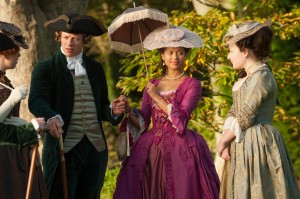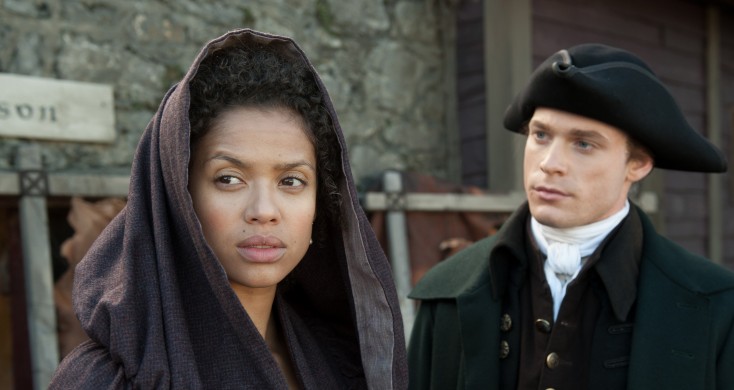
(center left to right) Sam Reid and Gugu Mbatha-Raw star in BELLE. ©Fox Searchlight. CR: David Appleby.
By ANGELA DAWSON
Front Row Features
HOLLYWOOD—Sam Reid joins a list of talented hunky actors from Down Under—Hugh Jackman, Heath Ledger, Eric Bana and the Hemsworth brothers—that have risen to stardom. The son of a farmer, he was drawn to acting at a young age. Playing the title role in “Hamlet” in high school cemented his determination to follow his dream, which first took him to New York and then to London.
Reid landed his first major movie role while still in drama school. Roland Emmerich cast him as the Earl of Essex in the 2011’s “Anonymous,” a period drama that questioned the authorship of Shakespeare’s works. The square-jawed actor with a booming voice has been on a tear ever since. He appeared as Tolbert McCoy in the acclaimed miniseries “The Hatfields & McCoys.” He also has appeared in a number of British TV series, including “MI-5,” and “Agatha Christie’s Marple.”
This year, Reid has no fewer than five films due out. He co-stars with Colin Firth and Nicole Kidman in “The Railway Man,” which is slowly rolling out to theaters. He also stars in the period drama “Belle,” playing a character very reminiscent of an iconic Firth character from several years ago.
By phone, Reid acknowledges that his John Davinier is much like Mr. Darcy of “Pride & Prejudice,” in that he is a man guided by his principles and bucking longstanding traditions in 18th century England.
“Belle” is the story of a mixed-race woman raised by British aristocrats in the late 1700s. Though her white lineage affords her certain privileges, the color of her skin prevents her from fully participating in the traditions of her social standing. Belle (played by British actress Gugu Mbatha-Raw) falls for an idealistic young vicar’s son (Reid) who wants to instigate change in Britain, and with her help, influences her high-standing guardian to decide a case that will bring about an end to slavery in England.
Inspired by real people and events, the script was written by Misan Sagay, who also adapted the novel “Their Eyes Were Watching God,” for an Oprah Winfrey-produced HBO movie that starred Halle Berry.
Sagay was inspired to write “Belle” after seeing a portrait in a Scottish castle of two girls, one black and one white, but obviously of the same social standing. After conducting extensive research on the 300-year-old painting, she discovered that the black girl was a young woman named Dido Elizabeth Belle, who was the illegitimate daughter of a wealthy Naval captain and a West Indies slave. She was raised by his great uncle, Lord Mansfield, who also was the Lord Chief Justice of England at the time, and who decided a case that eventually led to the end of slavery in Britain. Sagay deduced that Lord Mansfield was influenced in part by his mixed-race grandniece.
Since there was little actual historic documentation of John Davinier (other than his marriage to Belle), Reid says he relied on Sagay’s script to portray his progressive romantic character.
Q: This love story between John and Belle kind of reminds me a Jane Austen novel.
Reid: That’s part of the charm. One of the best things about the film is that it kind of lulls the audience into a known construct of the period drama that we’ve all seen before and it allows us to kind of not think so much about how it’s made but also about the ideas that underlying in it. That’s one of the strongest points of the film is that it comes from the world that we know but that there’s a unique perspective on it.
Q: Did it help that you didn’t have a lot of factual documentation about John Davinier to research so you could base the character on what was in the script and in your imagination?
Reid: Absolutely, because he is more of a fictional construct than the other characters, obviously. John Davinier is an amalgamation of a whole bunch of different characters, different political activists of the time. He was so well written that I got to really have fun with him and build that character with Amma Asante (the director), particularly, in the process. When you put on a costume and the wig and the whole thing’s there, and you realize this is a very modern man. He’s feeling very out of context, so it was great.
Q: What did they teach you about slavery in school?
Reid: We never had slavery in Australia. The idea that there was this biracial woman who lived in the aristocratic society in the time of the film was new to me. The fact that this story existed, I had no idea. That’s what I think is so great about the film, is that it gives us a perspective on slavery that we haven’t seen before, particularly in England. Nobody saw slavery. It wasn’t in their day-to-day life but the whole country ran off the slave trade. And, I always think it’s quite similar to the way we live now, more than any historical context, because there are a lot of things in the world that we have now, like iPhones or clothing, that are made in dubious places, that a lot of us don’t question because we wouldn’t want to give up the privileges we have. It’s a similar kind of world where these people weren’t questioning the fundamental truths about equality and where their financial independence is coming from. That’s what John was trying to say. Until we all change and we all see this, it’s going to be about all of us. It’s not just about race. It’s not just about slavery. It’s the fact that we’re all eating the pie.
Q: John wants to change the world, and he has radical and progressive ideas that weren’t in synch with what was going on in England at the time. Do you identify with his idealism?
Reid: What I could relate to was the kind of drive of youth. That sense that you can just go for anything and the more you push, the more you’ll succeed and the more things will come your way. With age, as Lord Mansfield tries to explain to him, is that with age you get more perspective and you learn how to be able to affect the world or change the world without it changing you too much. So I definitely could identify with this character who wanted everything and felt very passionate about things but perhaps went about it the wrong way.
Q: You have some great scenes with Tom Wilkinson, who plays Lord Mansfield, Belle’s guardian. How was it going toe-to-toe with him?
Reid: Tom was incredible. It was an amazing experience with him every day. It was very similar to the experience of the character. He’s quite an intimidating man, but he has kind heart and he’s so talented. I learned so much from him. But it was very useful in the first couple of scenes I had with him to feel the real weight of this man, who’s acting is extremely respected. To play the scene as a young lawyer who extremely respected the lord chief justice of England and to be able to carry that through was amazing.
Q: How was it working with Gugu?
Reid: Gugu and I had such a good time. The first time we me we were at the theater, by chance, two weeks before pre-production. I saw her across the room and she was with her mother. I came over and introduced myself to her, but it seemed very fitting because she had a chaperone. A period relationship ensued where we would go for walks, and developed a very formal and warm relationship. She was a great scene partner. We had so much fun.
Q: You’re no stranger to period pieces like “The Hatfields & McCoys”…
Reid: (He chuckles.) A bit dirtier period piece, that one.
Q: Do you love doing period dramas?
Reid: I don’t know if I love them, but those are the things that have come my way since I finished drama school three years ago. One of the joys of doing projects like this is that these characters feel so deeply about their lives. It’s not always a throwaway, kind of humdrum of daily existence. These people are fighting for love or fighting for change or fighting for vengeance, for what they feel is rightfully theirs and their heirs. So as an actor, these are extreme gifts to explore these heightened emotions. To be able to scream your love for a woman at her foster parents’ is an actor’s dream come true—to be able to explore these heightened emotions. I love doing the period dramas, though I probably should do something a bit more modern now. (He chuckles.)
Q: Are you going to play Mr. Darcy at some point?
Reid: (He laughs.) How I can play Mr. Darcy? I think I’ve done it now, haven’t I? In a period piece, it’s a different way of going about meeting somebody, and talking to somebody and falling in love with somebody. It’s more about falling in love with the mind and the conversation because sex is not an option. It’s an interesting way of trying to fall in love with each other because, at the end of the day, you’re falling in love with the person and their soul, which makes it more romantic.




